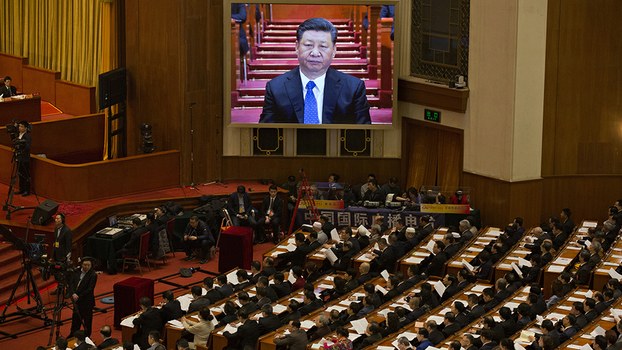




China's premier on Monday called on the country's parliament to unite behind President Xi Jinping, calling for loyalty and unity ahead of a key vote on proposed constitutional changes that could see the president continue in office indefinitely.
"We must unite more closely around the [ruling Chinese Communist] Party Central Committee with Comrade Xi Jinping as the core," premier Li Keqiang told delegates to the annual meeting of the National People's Congress (NPC). "We will unite, gather strength, and work solidly to create the future."
In his annual work report, Li also called on delegates to "resolutely protect the core status of General Secretary Xi Jinping, resolutely safeguard the authority of the party Central Committee and [a] centralized and unified leadership."
His words came after the Central Committee last month put forward constitutional amendments that would remove the two-term limit for the president and vice president.
The planned changes, which will almost certainly be approved by the rubber-stamp body, will pave the way for President Xi Jinping to remain in office beyond the end of his second term in 2023.
Public opposition to the move has been swiftly extinguished by government censors online.
Li's phrasing echoes that already used by officials in conjunction with the proposals, and will likely be interpreted as a direct call for delegates to back the amendments.
At a press conference on Sunday, vice foreign minister Zhang Yesui said that the constitutional amendments would be "conducive to safeguarding the authority and unified leadership of the party Central Committee with Comrade Xi Jinping as the core."
Wu Qiang, former lecturer in the department of political science at Tsinghua University, said he believes the amendments are sure to be approved.
"With no binding power or checks and balances, [Xi Jinping] will be a 'super-president'," Wu said. "This is actually a tremendous distortion of the original intention behind the constitution."
"It is a fundamental subversion and destruction of the political legacy of the Deng Xiaoping era," Wu added, in a reference to the late supreme leader who oversaw the birth of the 1982 constitution, including the two-term limit.
Military budget
The removal of limits also looks set to apply to the posts of party general secretary and the chairmanship of the Central Military Commission, the crucial trio of powers already held by the most powerful leader in China, Wu said.
The government has also unveiled the biggest rise in defense spending in recent years, with a rise of 8.1 percent in military spending this year, to U.S. $175 billion.
Premier Li said China will "advance all aspects of military training and war preparedness, and firmly and resolvedly safeguard national sovereignty, security, and development interests."
The boost in the defense budget comes as China is "faced with profound changes in the national security environment," Li said.
The increased spending has sparked fears in Taiwan that an increasingly hard-line government under Xi could step up military pressure on the democratic island, which has never been ruled by the Communist Party.
But analysts said China's military spending is still fairly low by the standards of developed countries.
"This is not a big increase," former Taiwan defense minister Lee Chong-pin told RFA on Monday. But he said the People's Liberation Army (PLA) is definitely upgrading.
"We can all see that the recent and rapid increase in China's military spending has been on the production of naval destroyers and fighter aircraft, especially the J20," Lee said. "Also on special technologies like quantum satellite communications and so on."
"The concern in the West is, what does it intend to do with it?"
Domestic security
Bruce Lui, senior journalism lecturer at Hong Kong's Baptist University, said the government had once more left out a total spending figure for domestic security, known as the "stability maintenance" regime that shores up the ruling party's grip on power by targeting dissidents, rights activists and other critics of the government.
"It's a numbers game," Lui said. "The government doesn't publish full and complete figures for stability maintenance spending, which is absolutely huge, across the whole country—more than a trillion yuan (U.S. $157.5 billion)."
He said the published military spending figure doesn't reflect all expenditure on defense, either, because some of the military budget is published under technological development.
There were also indications on Monday that former anti-corruption czar Wang Qishan has made a political comeback after leaving the party's Central Commission for Discipline Inspection last year. Wang, a long-time close ally of the president, sat on the leadership podium not far from Xi.
"This isn't a surprise, although I didn't think it would be quite so fast," a party history scholar surnamed Wang told RFA. "Also, I saw it as a slightly unorthodox move, rather than indicating a change to the entire system."
"It looks as if Xi will be president and Wang will be his vice president. They'll make a pair," he said.
Some analysts have predicted that State Councilor Yang Jiechi will take the vice president's job, however.
Reported by Gao Feng and Qiao Long for RFA's Mandarin Service, and by Wen Yuqing for the Cantonese Service. Translated and edited by Luisetta Mudie.